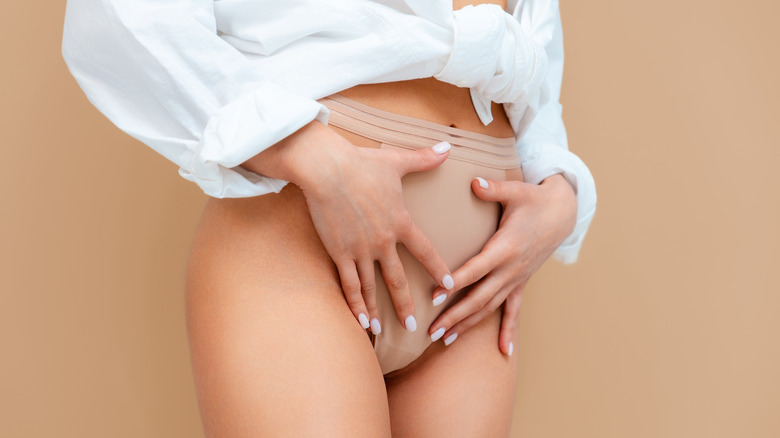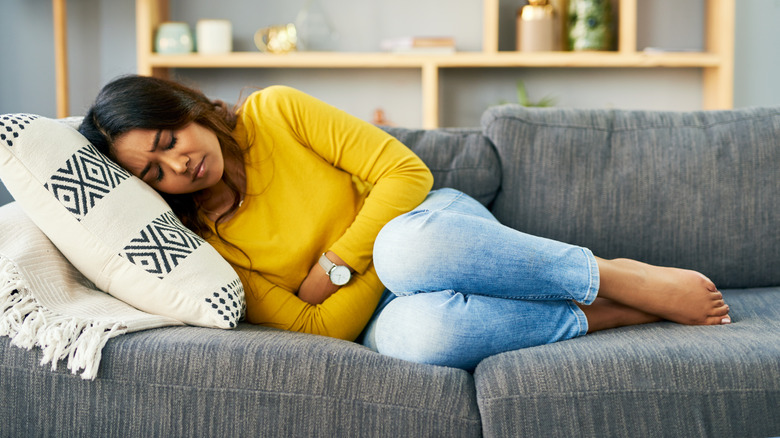What Really Happens To Your Body When You Stop Having Sex?
Americans are having less sex. According to a study from the Institute for Family Studies, over the past decade, more adults in the U.S. have decided to be abstinent. From 2017 to 2019, as many as 13% of women and 15% of men between the ages of 18 and 50 claimed they were not participating in sexual intercourse. On top of that, more people have come forward and spoken publicly about their decision to abstain from sex on social media. A trend known as CelibacyTok has emerged as a place for people to share their stories about staying away from sexual intercourse.
Of course, there are many reasons why a person may decide to practice celibacy, from religious to mental health reasons. Others may refrain from sex purely because they are not interested in it. But for those who have had sex and decided to abstain, there are actually some physical changes that come when you decide to close the door on coitus.
Heart health can decrease and blood pressure can rise
You may not think of it this way, but regular sexual intercourse can actually be a form of physical exercise. "[Sex] can raise your heart rate and [it] supports blood flow — so it can be good for your heart," sexologist Dr. Carol Queen explained to Well + Good. "The longer it lasts, the more often you have it, and the more vigorous you get, the more effect it will have," she added.
While that's great, if you decide it's time to take a break from getting intimate without adding a new form of physical activity, your body will notice. "If you're not having sex or engaging in other forms of exercise, you may see a rise in your [blood pressure and stress levels]," sexologist and Bloomi founder Rebecca Alvarez Story confirmed. Though the physical benefit sex is having on your heart may be minimal, it's still never a bad idea to keep your heart rate up.
If you go from having regular active sex to nothing at all in a short space of time, you may want to incorporate more exercise into your day-to-day routine. Increasing your heart rate with a brisk walk or spending a little extra time in the gym will replace the heart race increase you're missing and keep your blood pressure in check.
Vaginal tissue could be affected
Per Mayo Clinic, individuals who regularly partake in sexual activity tend to have stronger vaginal tissue because sexual stimulation increases blood flow to the area. Now, there's unlikely to be change if you abstain from sex for a few weeks or months. However, taking a longtime break from getting busy (like several years) could result in penetrative sex becoming slightly more painful upon resuming. Remember you should always consult a doctor or your OB/GYN if you're having uncomfortable sex, experiencing pain, or unexpected bleeding.
One way to keep the tissues healthy, regardless of whether you're having sex with a partner, is to practice masturbation. "Your vagina is a use-it or lose-it organ. Stimulation brings oxygenated, nutrient-rich blood to the vagina and vulva, which helps to keep the tissue supple, elastic, and lubricated," Tristan Weedmark, global passion ambassador of the sex toy brand We-Vibe explained to Self. Though what everybody wants to do with their own bodies is 100% their choice, choosing to masturbate while abstaining from partner sex can have a vast array of other benefits, including helping you to know yourself better and releasing stress-relieving hormones.
Post-menopausal people could encounter permanent changes to vaginal elasticity
While vagina owners who are pre-menopausal are more likely to have elasticity return if they start having sex again after abstinence, OB/GYN Dr. Salena Zanotti explained that people who are post-menopausal could experience irreversible change. She told Prevention, "It's really hard to get [the vagina] to stretch out again after menopause." This is because a body that has been through menopause produces less estrogen, which contributes to thickness of vaginal tissue.
That can lead to some discomfort once a break from sex is over. Fertility specialist and board-certified OB/GYN Dr. Lucky Sekhon told Well + Good, "Long periods of time without regular intercourse can lead to tightening of the vaginal canal [during menopause], which can lead to thinning of vaginal tissue and predisposition towards tearing [and] bleeding during sex." To minimize the risk, it's recommended those worried about permanent changes to vaginal elasticity use vaginal lubricants.
Your body may find it harder to get quality sleep
Did you know sexual intercourse releases a selection of hormones that help us get a good night's rest? That's actually one of the big reasons it's so beneficial for couples to get intimate at night. It's also why so many people feel so tired immediately after sex. Norepinephrine and serotonin are two of the main hormones released during orgasm, which can make you feel sleepy. "[They] help your body get into a flow of REM sleep cycles to help you stay comfortably asleep," sexologist Rebecca Alvarez Story explained of their benefits to Well + Good.
So, particularly for a body that's used to releasing these hormones on a regular basis, suddenly stopping them may make getting to sleep, and staying asleep, more difficult. If this sounds familiar, it may be time to get a new bedtime routine. A few things that can encourage quality sleep that don't involve sex? Taking a warm bath or reading before bed, or investing in things like pillow sprays or a white noise machine to aid drifting off peacefully.
Pelvic floor muscles can weaken
Although the jury's still out on how much sex can actually strengthen the pelvic floor muscles, it's widely accepted that sexual intimacy does benefit the pelvic floor in a number of ways. Not only does it keep the muscles active (just like our other muscles, the more they move, the stronger they are) in people with vaginas, it also helps keep the vaginal tissues and nerves healthy by encouraging blood flow. In fact, achieving orgasm can even actually help those who have pelvic floor issues. "Regular sexual activity can actually help alleviate symptoms by increasing core and pelvic strength," Dr. William Rush, a female pelvic medicine specialist, told Premier Health. That said, going a long period of time without any sexual activity could cause the pelvic floor muscles to weaken, resulting in physical issues. For instance, one study of 356 women found that those who abstained from sex were more likely to deal with incontinence (via International Society For Sexual Medicine).
But just because you're not having sex, that doesn't mean you have to deal with pelvic floor problems. There are methods to keep it strong that don't include intercourse, so it's never a bad idea to give these a go instead. One of the best ways to strengthen this part of your body is by doing specific pelvic floor exercises. The NHS recommends regularly sitting down and squeezing the pelvic floor muscles between 10 and 15 times, holding each squeeze for a couple of seconds before releasing. Remember though not to hold your breath or keep the stomach tight. Stay as relaxed as you can.
Menstrual cramps can worsen
Those unlucky enough to struggle with painful menstrual cramps know how difficult they can make everyday life. And while it's common to reach for OTC remedies like Midol, it turns out, having regular sex can actually help temporarily alleviate that pain. "The uterus is a muscle and many women will actually have a uterine contraction when they orgasm, which will cause the blood to expel more quickly, which will in turn decrease menstrual cramps. Also, there may be an increase in endorphins, which also will help with menstrual cramps," Dr. Lauren Streicher explained to The Healthy.
That said, if a person has grown used to sexual intercourse mitigating their period pain, suddenly stopping it would then cause their periods to be quite painful again. For this reason, masturbation is sometimes recommended to those looking for a natural way to deal with cramps. The contractions from a solo orgasm can mimic the effects of intercourse with a partner, as well as release similar hormones to help dull period pains.
Your libido may change
When you've not had sex for a while, your interest in it can vary. That may actually be a good or bad thing depending on how you feel about intimacy. Sexologist Dr. Jordin Wiggins, owner and creator of Health Over All Inc., explained why to Bustle. "Sex is not a drive that becomes more and more prominent without it — like hunger. Sex is a reward system, and when we're having good sex, we want more good sex," they shared. However, this means for a lot of people, they may not actually miss sex that much when they stop having it.
So, if your break from sex is voluntary, it may be good to hear that your body can easily get used to going without it. In fact, you may not even think too much about sex! However, if you're taking more of a forced break from sex for anything from medical reasons to a lack of having a partner, that could spell bad news if your desire is to get intimate with a partner again one day.
Your chances of getting a UTI or STD will lower
In addition to the decreased chances of contracting a Sexually Transmitted Infection (STI), you're also lowering your risk of developing a urinary tract infection (UTI) when you abstain from partner sex. According to a 2013 study, between 50% and 60% of people with vaginas will contract a UTI at some point in their life, with 80% of UTIs developing within 24 hours of sexual intercourse. That's because the movement involved in sex can push bacteria toward the urethra. "UTIs often occur when bacteria from the gut (specifically coming from the anus) travels forward to the urethra. If there is anal play during sex, avoid touching the anus and then the vulva and vagina," board certified OB/GYN, co-founder of Female Health Education and a Queen V medical expert, Dr. Sara Twogood suggested to Cosmopolitan.
It's important to remember that not all UTIs are caused by sexual interaction, so abstinence certainly doesn't mean you won't ever get another UTI. However, it can cut your chances down pretty drastically. Your chances of pregnancy or an STD, of course, will drop to zero.








